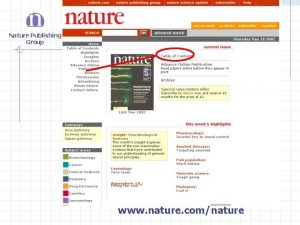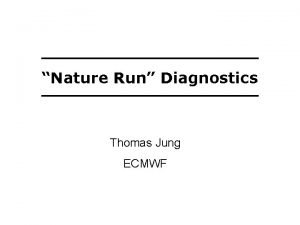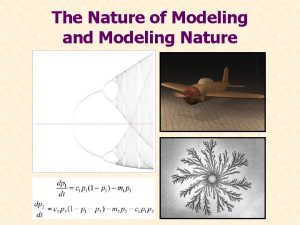The Nature of Research The Nature of Research

















- Slides: 17

The Nature of Research

The Nature of Research • Goals

The Nature of Research • Goals – Describe – Predict – Explain (theory-based) – Control – Improve practice

General Guidelines • Things witnessed or cared about are likely to be given greater weight • Experience leads to generalization • There can be conflicting generalizations, over-generalizations, ex post facto or, post hoc (retrospective) generalizations

• Good Research Questions Assumptions

• Good Research is Persuasive

“Disciplined Inquiry” • Agreed upon methods • Rules of sampling • Rules of gathering information • Explicit procedure • Systematic approach • Replication allowed

Dissonance • Self-persuasion

Research in Education

Falsification • Claims made should be available to others for falsification • Not for re-affirmation. Claims made available for others to find wrong assumptions, biased sampling, bad logic, poor testing methods, etc.

Studies 1. Descriptive study asks: How much X is in Y? 2. Functional Relationship asks: Is Y a function of X? 3. Correlational asks: If X changes, how does Y change? • Remember: Correlation does not equal Causation.

Types of Quantitative Studies 1. Survey: What is the reading level of 6 th graders in Tucson? 2. Correlational: How is reading related to parental education (+ or -)? 3. Longitudinal: How does reading for meaning develop with age? 4. Cross-sectional: How do 3 rd and 6 th graders score on reading tests?

Types of Quantitative Studies 5. “Natural” comparison. In what ways does reading in “open”classrooms differ from reading in structured ones? 6. Experimental To what extent does method X improve reading over method Y? [with controls in place] 7. Quasi-experimental To what extent does method X used with some students to reading improve work better than method Y?

Types of Qualitative Studies 8. Ethnographic: How do typical teachers teach beginning reading? 9. Historical: How did the concept of “literacy” change in the last 100 years? 10. Policy: What level of literacy is mandated in the Western States and how do political pressures affect the policies?



End part 1
 Nature of inquiry and research
Nature of inquiry and research Nature and nature's laws lay hid in night
Nature and nature's laws lay hid in night Nature nature controversy
Nature nature controversy Hình ảnh bộ gõ cơ thể búng tay
Hình ảnh bộ gõ cơ thể búng tay Frameset trong html5
Frameset trong html5 Bổ thể
Bổ thể Tỉ lệ cơ thể trẻ em
Tỉ lệ cơ thể trẻ em Gấu đi như thế nào
Gấu đi như thế nào Tư thế worms-breton
Tư thế worms-breton Chúa yêu trần thế alleluia
Chúa yêu trần thế alleluia Kể tên các môn thể thao
Kể tên các môn thể thao Thế nào là hệ số cao nhất
Thế nào là hệ số cao nhất Các châu lục và đại dương trên thế giới
Các châu lục và đại dương trên thế giới Công của trọng lực
Công của trọng lực Trời xanh đây là của chúng ta thể thơ
Trời xanh đây là của chúng ta thể thơ Mật thư tọa độ 5x5
Mật thư tọa độ 5x5 Phép trừ bù
Phép trừ bù Phản ứng thế ankan
Phản ứng thế ankan

































